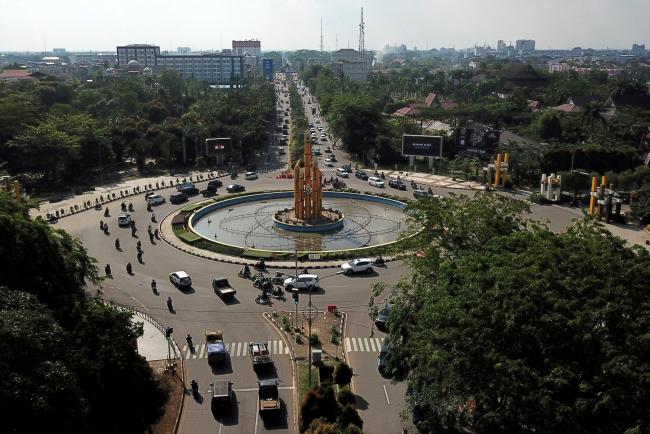(Bloomberg) -- For the most hawkish central banks in Asia, Thursday’s choice is less about whether to raise interest rates than by how much.
After Turkey and Russia surprised with strong policy action this month, the focus shifts to Indonesia and the Philippines this week as emerging markets struggle to contain a rout in their currencies. Pressure is building with the U.S. Federal Reserve expected to tighten monetary policy again on Wednesday, adding to risks of capital outflows.
Most economists surveyed by Bloomberg predict a 25 basis-point increase in Indonesia, and a 50 basis-point hike in the Philippines on Thursday. The currencies of both nations have slumped more than 8 percent against the dollar this year, the worst performers in Asia after India’s rupee.
“Indonesia and the Philippines will raise rates to anchor their currencies as risks remain,” said Joey Cuyegkeng, a senior economist at ING Groep (AS:INGA) NV in Manila. “For Indonesia, it’s about financial instability. A weak rupiah may cause instability in their markets and cause outflows. But for the Philippines, it’s inflation and inflation expectations.”
Of the 36 economists in the survey, 27 predict Bank Indonesia will raise its benchmark rate to 5.75 percent from 5.5 percent, while seven are forecasting a 50 basis-point hike. Two see no change. In a separate survey, all but two of the 22 economists said Bangko Sentral ng Pilipinas will boost the key rate to 4.5 percent from 4 percent.
Alongside India, the Philippines and Indonesia run widening current-account deficits, making them more vulnerable to a slump in investor sentiment.
Policy makers have already signaled the possibility of rate action this week to help calm markets. Bank Indonesia Governor Perry Warjiyo has pledged “pre-emptive, front-loaded” measures. Bangko Sentral Governor Nestor Espenilla -- who won’t be attending Thursday’s policy meeting because he’s on medical leave -- promised “strong, immediate” actions to curb inflation. Espenilla disclosed earlier this year that he received treatment for early-stage tongue cancer.
The central bank will not hesitate to take additional action and to continue its tightening stance, Deputy Governor Diwa Guinigundo said in an interview in London on Tuesday. The Philippines has a “good chance of meeting our inflation targets by 2019 or 2020,” he said.
Click to read: Philippine Central Bank Chief Takes Leave Ahead of Policy Review
For Indonesia, a rate hike is its strongest weapon to shore up investor confidence and guard its stock and bond markets against another currency storm.
“Volatility might continue as investors remain wary of the trade war impact and contagion from a potential fall of another emerging nation,” Andry Asmoro, senior economist at PT Bank Mandiri in Jakarta, who forecast a 25 basis-point hike.
Indonesia’s Toolkit
Southeast Asia’s largest economy has already raised its key rate by 125 basis points this year, curbed imports and burned through about 10 percent of its reserves to support the rupiah.
Click to read: What Else Is Left in Indonesia’s Toolbox to Help Bolster Rupiah?
Meanwhile, the Philippines is fighting to stave off pressure on inflation, which hit a nine-year high of 6.4 percent in August, and may hit 7 percent this month. Rising costs are hitting consumers and companies and could derail economic growth.
The government is “seriously considering” price caps on food items like rice, pork and chicken, Trade Secretary Ramon Lopez said in a separate interview in London on Tuesday.
The nation “faces strong inflationary pressures” with the recent typhoon adding to risks, said Trinh Nguyen, a senior economist at Natixis Asia Ltd. in Hong Kong, who penciled in a 25 basis-point increase. A stronger half-point hike means authorities “want to assure markets that it is fighting inflation aggressively.”
Read more: Philippines Considers Price Controls on Rice, Pork, Chicken
Bangko Sentral, which was initially criticized for being slow to act against inflation risks, has raised its key rate by 1 percentage point since May. Standard Chartered (LON:STAN) Plc. predicted another 1-point increase for the rest of 2018 starting from Thursday.
While the worsening global trade war is adding to risks, the recent rally in emerging-market assets offer some respite and could ease pressure for more hikes in the future.
“Who has more degrees of freedom to pause? Indonesia, if we see further calm in emerging-market sentiment,” said Rahul Bajoria, senior economist at Barclays (LON:BARC) Plc. in Singapore.
(Updates with comments from Philippine central bank deputy governor, trade secretary.)
